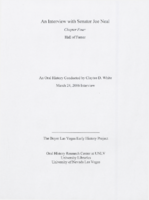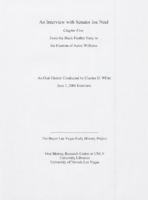Search the Special Collections and Archives Portal
Search Results

Transcript of fourth interview with Senator Joe Neal by Claytee D. White, March 24, 2006
Date
Archival Collection
Description
Fourth interview in a series of five with Nevada State Senator Joe Neal conducted by Claytee D. White on March 24, 2006. Born in Mounds, Louisiana, in 1935, Neal joined his family in Las Vegas as a young man shortly before serving in the United States Air Force from 1954 to 1958. Following his military service, he earned a bachelor's degree in political science at Southern University in Baton Rouge, Louisiana. Neal continued his education at the Institute of Applied Science in Chicago, Illinois, with postgraduate work in law. From 1973 to 2001, he served in the Nevada Legislature as the Senator from Clark County Senatorial District No. 4. In the fourth interview, Neal shares opinions on capital punishment, southern Nevada utility ownership, the ethics and political influence of the gaming industry, high hospital costs, and the bailout of the Economic Opportunity Board, among other issues. He comments on his induction into the Nevada State Senate Hall of Fame and reviews changes in Las Vegas over the years, particularly in education. Neal closes with thoughts on the future of downtown Las Vegas and the potential impact of planned renovations and high-rise buildings on the Westside.
Text

Transcript of fifth interview with Senator Joe Neal by Claytee D. White, June 1, 2006
Date
Archival Collection
Description
Fifth interview in a series of five with Nevada State Senator Joe Neal conducted by Claytee D. White on June 1, 2006. Born in Mounds, Louisiana, in 1935, Neal joined his family in Las Vegas as a young man shortly before serving in the United States Air Force from 1954 to 1958. Following his military service, he earned a bachelor's degree in political science at Southern University in Baton Rouge, Louisiana. Neal continued his education at the Institute of Applied Science in Chicago, Illinois, with postgraduate work in law. From 1973 to 2001, he served in the Nevada Legislature as the Senator from Clark County Senatorial District No. 4. In the fifth interview, Neal recalls the rise of the Black Panther Party and the atmosphere of fear when Patty Hearst was kidnapped by the Symbionese Liberation Army. In closing, Neal relates that voting machines were impounded to protect votes for Aaron Williams, the first black elected to the city council of North Las Vegas, and shares memories of Judge Mendoza.
Text
Audio recording clip of interview with Eugene Buford by Claytee D. White, September 12, 2006
Date
Archival Collection
Description
Part of an interview with Eugene Buford conducted by Claytee D. White on September 12, 2006. In the clip, Buford reflects on changes in Las Vegas spurred by integration.
Sound
William E. Ferron Family Papers
Identifier
Abstract
The William E. Ferron Family Papers (1917-1976) are comprised of materials that document the lives of the Ferrons, one of the pioneer families of early Las Vegas, Nevada. It includes biographical material, speeches, and ephemera on patriarch William E. Ferron and his wife, Mary Ruth Cooper Ferron, as well as their two daughters, Barbara Ferron Doyle and Shirley Elizabeth Ferron Swanson.
Archival Collection

Don Perry interview, March 05, 1978: transcript
Date
Archival Collection
Description
On March 5th, 1978, Karen Croteau interviewed Don Perry (b. 1928 in Clarksburg, West Virginia) about Paiute Indians and life on a reservation. Perry begins by mentioning his own Indian heritage with a Cherokee mother and his wife’s Paiute heritage. Perry focuses on his conversations with his wife’s grandmother, who lived on the Paiute reservation since birth, from who he learned about the reservations history. He particularly delves into the traditions of Indian burials, governing on the reservation, and the difference between an Indian reservation and an Indian colony. Additionally, he talks about recreation on the reservations, education of Paiute Indians, and how reservations have changed. Throughout the interview, Perry gives personal anecdotes about his life in connection to the Paiute people and his experiences with their traditions and belief systems. Perry ends by discussing governing politics of the Paiute reservation and the start of Las Vegas as a gambling town.
Text

Transcript of interview with William F. Kelsey by James M. Green, January 20, 1975
Date
Archival Collection
Description
On January 20, 1975, collector businessman, James M. Greene interviewed businessman, William F. Kelsey (born November 6th, 1908 in Pasadena, California) in his home in Nelson, Nevada. Mrs. Kelsey is also present during the interview. This interview covers the life and times of Mr. Kelsey.
Text

Transcript of interview with Phillip L. Cook by Richrad Strahan, March 3, 1977
Date
Archival Collection
Description
On March 3, 1977, Richard Strahan interviewed Phillip L. Cook (born 1939 in Las Vegas, Nevada) about his life in Southern Nevada. Cook first talks about his parents’ move to Nevada and then describes how the school system has changed over time. He then describes the first businesses that opened up in the Downtown and Strip areas in Las Vegas before discussing prostitution, Block 16, and recreational activities available to youth. Cook also talks about the first television sets and telephone systems made available, and he moves on to talk about the prices of things such as movies and haircuts when he was younger. The interview then moves to discussions on the Old Ranch, racial discrimination, school integration, the crime rate, and the school system in Las Vegas.
Text

Transcript of interview with William Carlson by Alice Brown, March 19, 1980
Date
Archival Collection
Description
Text

Transcript of interview with Donna Henshaw by Jeff Thompson, February 12, 1978
Date
Archival Collection
Description
On February 12, 1978, collector Jeff Thompson interviewed short-order cook and maid, Donna Henshaw (born on February 11, 1937 in Appleton, Minnesota) in the collector’s home in Las Vegas, Nevada. This interview covers the history and development of the Las Vegas area.
Text

Transcript of interview with Nancy Horden by Ward Murashige, February 26, 1980
Date
Archival Collection
Description
On February 26, 1980, collector Ward Murashige interviewed Nancy Horden (born February 7th, 1921 in Las Vegas, Nevada) in James Dickenson Library at the University of Nevada, Las Vegas. The interview covers Nancy’s family background, and life in Nevada, including home life, recreation, and hobbies. During this interview, Nancy also discusses local development, and the social and environmental changes that have occurred over the span of her lifetime in Las Vegas, Nevada.
Text
